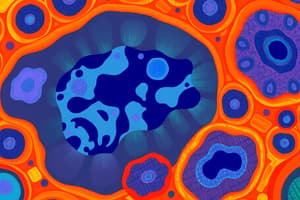Podcast
Questions and Answers
Epithelial tissues are sheets of cells that cover ______ surfaces of the body and line internal cavities.
Epithelial tissues are sheets of cells that cover ______ surfaces of the body and line internal cavities.
external
Epithelial tissues are classified based on ______ and morphology.
Epithelial tissues are classified based on ______ and morphology.
stratification
The ______ separates epithelial tissues from underlying connective tissues.
The ______ separates epithelial tissues from underlying connective tissues.
basement membrane
The upper layer of the basement membrane, the basal lamina, is directly connected to ______ cells.
The upper layer of the basement membrane, the basal lamina, is directly connected to ______ cells.
Motile cilia are found in the uterus, fallopian tubes, efferent ducts, and testis, where they are responsible for transporting ______.
Motile cilia are found in the uterus, fallopian tubes, efferent ducts, and testis, where they are responsible for transporting ______.
Microvilli, a type of non-motile apical modification, are found in the small intestine and the ______ of the kidney, aiding in nutrient and fluid absorption.
Microvilli, a type of non-motile apical modification, are found in the small intestine and the ______ of the kidney, aiding in nutrient and fluid absorption.
The junctional complex consists of tight junctions, adhering junctions, and ______, which provide firm adhesion between cells.
The junctional complex consists of tight junctions, adhering junctions, and ______, which provide firm adhesion between cells.
Basally, hemidesmosomes attach cells to the basement membrane, and gap junctions allow for the ______ of molecules and cell-cell communication.
Basally, hemidesmosomes attach cells to the basement membrane, and gap junctions allow for the ______ of molecules and cell-cell communication.
Flashcards
Epithelial Tissue
Epithelial Tissue
Sheets of cells covering external surfaces and lining internal cavities.
Classification of Epithelia
Classification of Epithelia
Epithelia are classified by layer number and cell shape.
Basement Membrane
Basement Membrane
A structure that anchors epithelial cells to underlying connective tissue.
Nutrient Delivery in Epithelia
Nutrient Delivery in Epithelia
Signup and view all the flashcards
High Mitotic Rate
High Mitotic Rate
Signup and view all the flashcards
Motile Cilia
Motile Cilia
Signup and view all the flashcards
Non-Motile Apical Modifications
Non-Motile Apical Modifications
Signup and view all the flashcards
Junctional Complex
Junctional Complex
Signup and view all the flashcards
Study Notes
Epithelial Tissues: Structure and Function
- Sheets of cells covering external surfaces (e.g., skin) and lining internal cavities of organs. Primary function is protection and covering.
- Classified by stratification (number of cell layers) and cell shape.
- Separated from underlying connective tissue by the basement membrane. This membrane anchors epithelial cells. It's composed of the basal lamina directly connected to the epithelium and the reticular lamina underneath.
- Highly vascularized (except the inner ear's stria vascularis)— most receive nutrient and waste removal through diffusion; epithelia is too thick, diffusion may not be possible.
- High mitotic rate ensures continuous cell replacement. Apical surfaces are luminal surfaces—surfaces facing the lumen.
Special Surface Modifications
-
Motile cilia: Found in the uterus, fallopian tubes, efferent ducts, and testes. Motile cilia function in moving gametes (sperm) and mucus in the respiratory tract.
-
Non-motile cilia:
- Microvilli are small projections that increase surface area for absorption; found in small intestines and proximal convoluted tubules (PCT) of the kidneys.
- Stereocilia are longer projections found in regions like the epididymis, vas deferens, and inner ear.
-
Junctional complexes:
- Tight junctions form a seal preventing material passage between cells.
- Adhering junctions provide strong cell adhesion.
- Desmosomes provide structural support, resisting shearing forces.
-
Basal attachments: Hemidesmosomes attach cells to the basement membrane.
-
Intercellular communication: Gap junctions facilitate the selective passage of molecules enabling cell-to-cell communication.
Studying That Suits You
Use AI to generate personalized quizzes and flashcards to suit your learning preferences.




